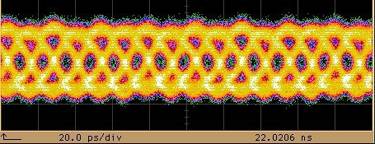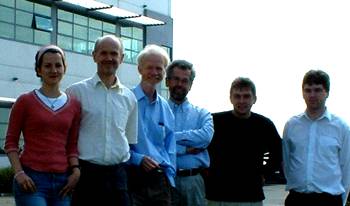 An 'eye diagram' displaying binary digital optical signals at
80 Gbit/s
Everyone knows of the widespread
prevalence of electronics in
modern life - but relatively few people are aware of the increasing use of photonics. In fact, probably without realising, many of us already use photonics in our everyday lives. They are found in compact disk and DVD players, office printers, supermarket checkouts, and numerous other places. Most important of all, photonics is the underlying technology supporting today's worldwide telecommunications networks and the Internet. Increasingly also photonics is being used in the most powerful computers.
An 'eye diagram' displaying binary digital optical signals at
80 Gbit/s
Everyone knows of the widespread
prevalence of electronics in
modern life - but relatively few people are aware of the increasing use of photonics. In fact, probably without realising, many of us already use photonics in our everyday lives. They are found in compact disk and DVD players, office printers, supermarket checkouts, and numerous other places. Most important of all, photonics is the underlying technology supporting today's worldwide telecommunications networks and the Internet. Increasingly also photonics is being used in the most powerful computers.
In photonic systems the information signals are conveyed as pulses of light, rather than electricity, and these optical signals are transmitted by sending them along optical fibres - strands of special glass around 100 �m in diameter. One of the great advantages of photonics is that these fibres can carry thousands of times more information than electrical wires. In recent years, there have been important advances in research labs around the world to develop photonic 'systems' - ways of using these photonic devices in telecommunications, computing, security, and many other applications. By using photonics, these systems can work more effectively - with greater speed or information capacity - or might simply be smaller and easier to make.
 The UCC photonic systems research group at their new location in the Cork Airport Business Park
In May 2003, a new research group at UCC was formed to investigate advanced photonic systems. The group, based in the Physics Department, takes as its nucleus six of the principal members of the photonic systems group at the former Corning Research Centre and British Telecom Laboratories in Suffolk, UK. The research programme, supported by Science Foundation Ireland, covers a broad range of advanced and novel photonic systems with applications in ICT (information and communications technology), and complements activities in photonic technologies at the National Microelectronics Research Centre and also related photonics work in the Physics and Engineering Departments at UCC.
The UCC photonic systems research group at their new location in the Cork Airport Business Park
In May 2003, a new research group at UCC was formed to investigate advanced photonic systems. The group, based in the Physics Department, takes as its nucleus six of the principal members of the photonic systems group at the former Corning Research Centre and British Telecom Laboratories in Suffolk, UK. The research programme, supported by Science Foundation Ireland, covers a broad range of advanced and novel photonic systems with applications in ICT (information and communications technology), and complements activities in photonic technologies at the National Microelectronics Research Centre and also related photonics work in the Physics and Engineering Departments at UCC.
Contact: Prof. David Cotter, Department of Physics, UCC.
E-mail:
[email protected]
|


